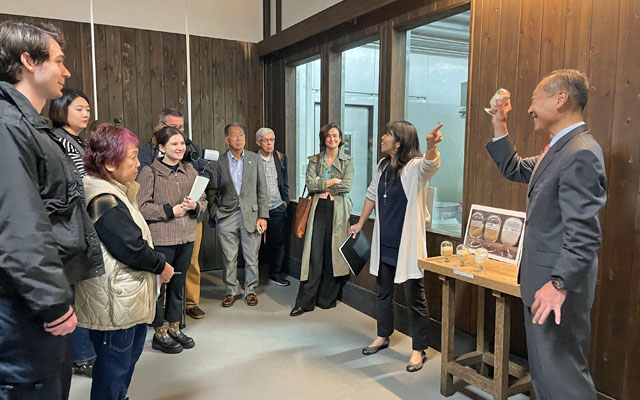Japan’s gourmet tourism sector is set to receive a boost from UNESCO’s anticipated recognition of koji mould-based alcohol brewing techniques as an Intangible Cultural Heritage, expected in early December.
Koji, which contains enzymes that break down starches into sugar, is used to make sake, shochu and awamori: three traditional Japanese alcoholic beverages. This brewing technique promotes “strong social ties and cohesion among craftspeople and communities” while also supporting sustainability and food security by “safeguarding clean water and essential grains,” according to the UNESCO advisory panel that made the recommendation.
 Visitors enjoying an immersive experience in Japan’s rich brewing traditions; photo by Kathryn Wortley
Visitors enjoying an immersive experience in Japan’s rich brewing traditions; photo by Kathryn Wortley
A final decision on the listing will be made at the UNESCO intergovernmental committee meeting in Paraguay. Success would increase awareness of sake, shochu and awamori, which could lead to more inbound tourists seeking tours, tastings and other related experiences while visiting.
“We want people around the world to know about our alcoholic beverage making in the same way they know about Georgian wine making and Belgian beer making,” Hitoshi Utsunomiya, director of the Japan Sake and Shochu Makers Association, told TTG Asia.
“Brewery tourism in Japan is now at an early stage, nothing like California’s wine tourism – but we hope that the designation will help its development,” he continued.
Japan has more than 1,500 sake breweries, with the largest production in Hyogo, Kyoto and Niigata prefectures, but most currently aren’t open to visitors.
However, greater interest in sake is expected to attract funding for brewing and conservation, as well as the development of more tourism products.
Utsunomiya cited the example of Ozawa Brewery in west Tokyo, which features a restaurant with views of the countryside. “We will see more of this kind of offering going forward,” he opined.

AloJapan.com